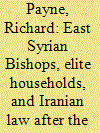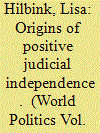| Srl | Item |
| 1 |
ID:
137178


|
|
|
|
|
| Summary/Abstract |
This article is an exploration of the interconnected legal ties between Christians and Zoroastrians in the early Islamic era. Drawing from the writings of the Christian authors Ishobokt, Simeon, and Henanisho, Payne describes how East Syrian bishops appropriated laws of marriage, inheritance, and property from Iranian jurisprudential traditions as a means of transferring wealth intergenerationally and extending their judicial authority. Payne thus explores the ways in which the Christians of Iran were influenced by the Iranian legal system and culture and in the seventh century CE.
|
|
|
|
|
|
|
|
|
|
|
|
|
|
|
|
| 2 |
ID:
119679


|
|
|
|
|
| Publication |
2012.
|
| Summary/Abstract |
A number of comparative judicial scholars have argued that assertions of judicial authority are a function of the level of fragmentation/competition in the formal political sphere. Accordingly, in authoritarian or one-party settings, judges should be deferential to power holders, and in places where political power is divided between branches and/or parties, one would expect to see greater levels of judicial assertiveness. Through a longitudinal, qualitative analysis of one most-likely case (Chile) and one least-likely case (Franco-era Spain) and drawing on a half-dozen other cases from the comparative judicial literature, this article argues that political fragmentation is neither sufficient nor necessary for judges to challenge powerful actors. Instead, it argues that assertive or "positively independent" judicial behavior requires ideational support, in the form of a role conception/professional ideology that gives judges motivation for such behavior. Such professional attitudes are socially and institutionally constituted in a dynamic process that itself shapes judges' perceptions of the opportunities for and obstacles to judicial assertiveness, both within and outside the judiciary.
|
|
|
|
|
|
|
|
|
|
|
|
|
|
|
|